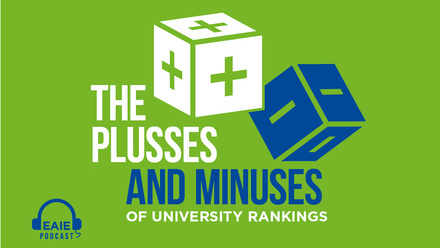Benchmarking your university: Why and how?
.jpg.jpg)
What reputation does your institution have in the higher education sector? How do you differentiate from the competition? How can you learn from those institutions you cooperate or compete with? Find out how to launch effective collaborative benchmarking projects with other universities to make more informed strategic decisions and improve your institutional performance in the field of international higher education.
Effective decision-making is evidence-based. Benchmarking enables the structured sharing of ideas and good practices on institutional strengths and weaknesses. Information on institutional current performance and the quality of the internationalisation process is turned into new opportunities for strategic institutional developments. Benchmarking helps reach out in a more efficient way to a variety of internal and external stakeholders, making better decisions for institutional developments. It helps raise awareness, visibility, institutional profile, reputation and gain a strong competitive advantage.
What are the benefits of benchmarking for my institution?
Not many people or organisations really understand what benchmarking is all about. They only collect a few figures here and there or discuss a few ideas with other institutions. This does not lead to effective benchmarking as a rigorous ongoing process to improve performance. When taken seriously, benchmarking helps to:
- Self-assess your institution
- Understand the processes of strategy formulation and implementation
- Gain information and data about your own and other institutions to support decision-making
- Identify areas for improvement and set targets for institutional developments
By joining collaborative benchmarking groups, universities take part in a developmental approach which they shape themselves to their institutional needs. They learn together with other institutions how they can improve strategy by comparing their processes in a highly structured way.
What areas can benchmarking exercises focus upon?
Benchmarking exercises can focus on almost anything, as long as you are currently engaged in the practice and are confident that you can gather sufficient data for analysis.
In the field of internationalisation you can look at international support services, student mobility, internationalisation of the curriculum, joint study programmes, research, and so on.
Other than internationalisation, we have benchmarked financial management, human resource management, regional engagement and innovation, university-enterprise cooperation, quality management and a whole range of other areas.
How do I go about it embarking on a benchmarking exercise?
First you need to decide what you want to find out about your institution and which universities you would like to benchmark with. Do you want to compare with other universities in your country and in your close networks, or with universities in other parts of the world with which you want to engage in future collaborations? Do you want to initiate and steer the benchmarking exercise yourself or do you need external support with its management? Check out this sneak preview of the intensive benchmarking course:
By Nadine Burquel, Director of BCS Consultancy Services
Sign up for the upcoming EAIE Academy to learn more about the topic.






